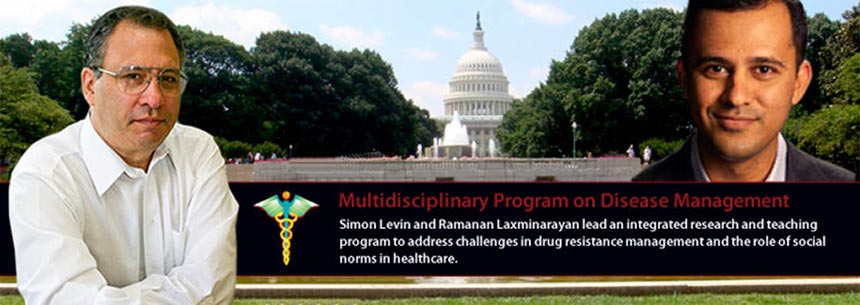Multidisciplinary Program on Disease Management: Drug Resistance and Social Norms

2008-12 Seed Grant
The objective of this project was to organize an integrated research and teaching program addressing the role of the social context in the management of disease. The focus of the program was on two elements – first, challenges in drug resistance management, and second, the role of social norms in health care. The work has primarily focused on strategies to reduce the likelihood of antibiotic and anti-malarial resistance.
A post-doctoral researcher, Maciej Boni was funded by a grant from the Bill and Melinda Gates Foundation and collaborated with Levin and Laxminarayan in his work on optimal strategies to delay emergence of drug resistance. A second post-doc, Patricia Geli-Rolfhamre, continued this work to look at the effect of duration and dosing of antibiotic treatments on the emergence of drug resistance.
Educational Impacts
Laxminarayan taught a new course, “Disease Ecology, Economics and Policy,” jointly listed at PEI, Economics, and EEB. The program has also been successful in the development of research projects for undergraduates interested in the interface between health care and socioeconomic considerations.
The GC award has supported nine interns who have worked in Washington, DC and in field sites in Nairobi and New Delhi on various aspects of drug resistance and management of infectious diseases. Topics included the impact of insecticide-treated bed nets on malaria transmission factors in Sub-Saharan Africa, the geographical distribution of antibiotic resistance in India, pathogens in foods in Kenya and the region, and antibiotics resistance and malaria.
Other Outcomes
The project has resulted in four publications:
- Trends in Resistance to Carbapenems and Third-Generation Cephalosporins among Clinical Isolates of Klebsiella pneumoniae in the United States, 1999–2010 (PDF)
- Antibiotic Overuse: The Influence of Social Norms (PDF), published in the Journal of the American College of Surgeons
- Benefits of Using Multiple First-Line Therapies Against Malaria (PDF), published in the Proceedings of the National Academy of Sciences
- Antibiotic Effectiveness: New Challenges in Natural Resource Management (PDF)
- Community-Associated Methicillin-Resistant Staphylococcus Aureus in Outpatients, United States, 1999–2006 (PDF)
Future Directions:
Levin and Laxminarayan next propose to test the hypothesis that providing information on one’s own antibiotic prescribing practices in relation to that of other physicians can change prescribing behavior. This work will be carried out in seven U.S. hospitals in collaboration with the Division for Healthcare Quality of the Centers for Disease Control and Prevention (CDC) and funded by CDC and the Extending the Cure project at the Center for Disease Dynamics, Economics & Policy.
Participating Department
Collaborating Institutions
Related Media and Press Coverage
- New York Times Blog about Spread of Pneumonia Strain with Increasing Resistance to Antibiotics
- New Study Highlights Importance of Appropriate Antibiotic Use in Community Settings
- IMF Publication Highlights Antibiotic Resistance Among Top Four Global Health Threats
- The Economic Costs of Withdrawing Antimicrobial Growth Promoters from the Livestock Sector
- Global Livestock Antibiotic Use Expected To Increase 67% By 2030
Participants
Research Associates
- Maciej Boni
- Patricia Geli-Rolfhamre, Visiting
Undergraduate Students
- Hilary Bartlett ’12
- Rebecca Butler ‘10
- Sophia Jih ’12
- Erica Leavitt ’11
- Josephine Yolisa Nalule ‘10
- Agatha Offorjebe ’09
- Kashyap Rajagopal ’14
- Yuna Sakuma ’11
- Ashley Schoettle ‘10
- Ryan Shyu ’13
- Lova Sun ’11
- Aditi Vasan ‘10
- Camila Vega ’12
- Jane Zhao ‘11





